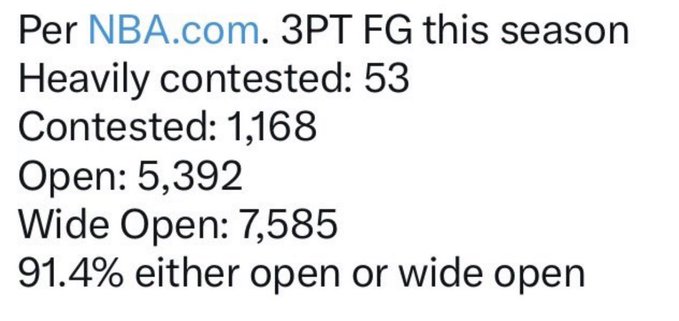DQuinn1575 wrote:so players are playing less and what are we getting?
in 1998 41 guys age 34 and over played
so far in 2026 we have 29,
And that is with more roster spots available.
So less guys are playing to an older age.
Minutes played - last year Bridges easily led league and had over 3.000 minutes
1997 21 guys were over 3,000, and the 2nd place finisher in 2025 would have finished 41st in 1997.
If the game is giving us a situation where star players play less games in a season and then their careers arent even longer, you have an issue.
If it it due to the way the game is being played, then they need to look at this and figure out what tweaks will make it healthier for the players.
So let me say first that this topic is a challenging one and I don't think anyone has the entire picture - certainly myself included.
I do think that a major chunk of the problem regarding the missed games is simply that NBA teams and players know that regular season games don't really matter. You combine a) the existence of the playoffs as paramount and b) the fact that any contender knows they are guaranteed to make the playoffs even if they coast in the regular season, with c) the s**t the Warriors got as their reward for pushing hard to break the regular season W-L record and then losing the finals, and the BIG issue as I see it is that it's trivial to describe a solution that would fix the problem (play a lot less regular season games and allow less teams in the playoffs), it's unrealistic to see said solutions implemented.
But DQuinn your post struck me as something novel that I wanted to look into and possibly push back. Before I dig into data at all, I should say that my view point is colored here by diving into the WNBA analytically these past few years where I've seen a particular trope that I think was delusional:
In the WNBA, it hasn't been uncommon for 1st round draft picks (with 3-4 years of college experience) to get cut, with the apparent explanation being that the level of play in the WNBA is just so strong compared to college that players in their 30s are better than these 22 year olds.
But then last year, we saw an expansion team (Golden State Valkeries) come in with a bunch cast offs from other teams and be a better than average team in the league instantly, and meanwhile we see star veterans continued to not only get run, but retain primacy year after year even as the analytics tell me that this shouldn't at all be the case.
This then to say: I believe the WNBA is "artificially" old because the franchises have felt more comfortable sticking with established names even though the analytics could have told them they'd literally be better off starting over.
I wonder if the same might be said to be true about the NBA in the '90s relative to now. Aside from the analogy of the logic, there's the matter that the elites of the NBA are playing longer than ever. If only lesser veterans are getting the chop, then perhaps part of what's different here is that in the modern analytic NBA, your prior reputation counts for less than it did in the past.






































